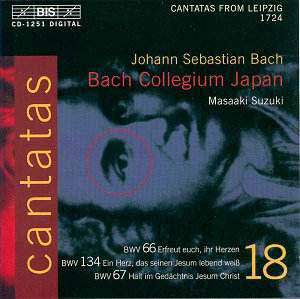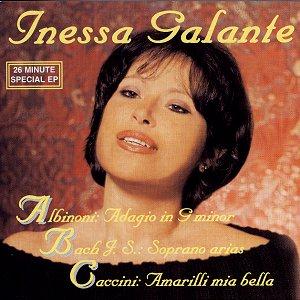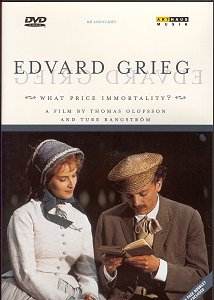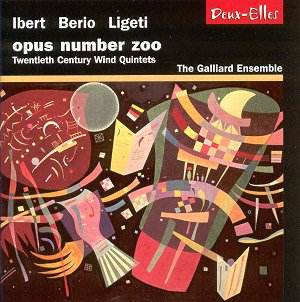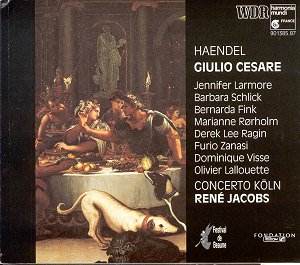 Composer: Georg Frideric Handel
Composer: Georg Frideric Handel
Works: Giulio Cesare
Performers: Jennifer Larmore (Cesare), Barbara Schlick (Cleopatra), Bernarda Fink (Cornelia), Marianne Rorholm (Sesto), Derek Lee Ragin (Tolomeo), Furio Zanasi (Achilla), Dominique Visse (Nireno), Olivier Lallouette (Curio), Concerto Köln, René Jacobs (director)
Recording: HARMONIA MUNDI HMC 901385.87 (4 CDs priced as three)
Label: Harmonia Mundi
Handel’s Giulio Cesare remains a towering achievement in the operatic canon, celebrated not only for its intricate vocal lines and dramatic depth but also for its remarkable historical context. Premiered in 1724, the opera showcases Handel’s unparalleled ability to fuse music with narrative, enhancing the political and personal turmoil of its characters. This latest recording under René Jacobs with Concerto Köln offers a fresh perspective on a work that has become a cornerstone of the Baroque repertoire, presented with vibrant orchestration and a cast of exceptional singers.
Jacobs’s interpretation stands out for its cohesive vision and the lively interplay between the singers and orchestra. The Concerto Köln provides a spirited performance, characterized by its transparent textures and dynamic contrasts. The division of the orchestra into smaller groups allows for intricate dialogues between instruments, particularly the expressive use of bassoons and the striking obbligatos for violin, oboe, and horn. This layering enriches the aural tapestry of Giulio Cesare, exemplified in the pivotal aria “Che sento?” where the bassoon’s poignant interventions underline the emotional weight of Schlick’s delivery. The engineering quality captures these nuances beautifully, allowing the listener to appreciate the subtleties of both vocal and instrumental contributions.
Jennifer Larmore’s portrayal of Cesare is particularly noteworthy. Her execution in “Presti omai” is a masterclass in vocal agility, with flawless runs complemented by a robust lower register that conveys both strength and vulnerability. Larmore’s dramatic intensity is palpable throughout, particularly in her interaction with other characters, which enhances the opera’s narrative drive. In contrast, Barbara Schlick’s Cleopatra, while somewhat limited in vocal color, compensates with a keen interpretative insight. Her performance of “Tu la mia stella,” taken at a slightly slower tempo than usual, reveals a deliberate choice to emphasize the aria’s emotional core, showcasing her nuanced control of dynamics and phrasing.
The supporting roles are equally compelling. Derek Lee Ragin’s Tolomeo adds a layer of complexity, using his countertenor voice to great effect in “Va tacito,” which is imbued with an unexpected gravitas through its slower tempo and elaborate ornamentation. This choice, while unconventional, enriches the character’s emotional landscape. Bernarda Fink as Cornelia and Marianne Rorholm as Sesto deliver a stunning duet that exemplifies the recording’s high standards of ensemble work; their blend of voices is both powerful and sensitive to the operatic drama unfolding.
While Jacobs’s commitment to expressive tempi is often laudable, there are moments of miscalculation that may detract from the overall experience. The recitative following Cesare’s “Almi del gran Pompeo” feels sluggish, undermining the momentum leading into the rustic “Non è sivago.” Such choices, while arguably meant to create dramatic contrasts, occasionally disrupt the flow of the narrative. Nonetheless, these instances are overshadowed by the recording’s many strengths, including the orchestra’s vigorous contributions and the singers’ technical prowess.
This recording of Giulio Cesare not only solidifies its place in the pantheon of Handel’s operas but also sets a new benchmark for its interpretation. With Jacobs at the helm, the performance is alive with energy and emotional depth, ensuring that this version stands out among a crowded field of recordings. The interplay of singers and the orchestra reflects a deep understanding of the score’s intricacies, making it a definitive choice for both newcomers and seasoned aficionados of Baroque opera.
